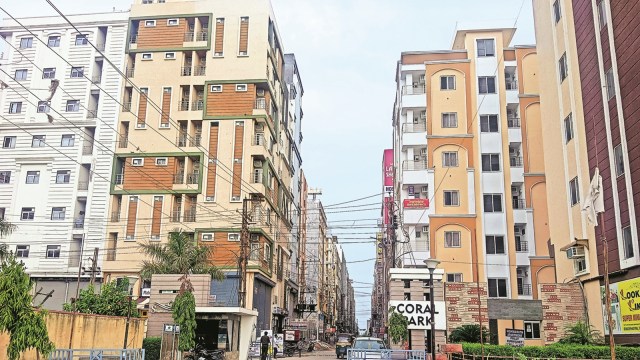As student numbers dip, Kota’s luxury hostel project turns into a ‘ghost town’
Around 4,000 hostels or “residencies” and 40,000 paying guests (PGs) in Kota are dependent on these aspirants for their livelihood. In fact, almost every residential property here has been converted to a rental accommodation charging about Rs 7,000 per student per month, including food.
 Designed solely to meet the residential needs of coaching aspirants, only 8,000 of 22,000 rooms in Coral Park are occupied at present. (Express Photo by Parul Kulshrestha)
Designed solely to meet the residential needs of coaching aspirants, only 8,000 of 22,000 rooms in Coral Park are occupied at present. (Express Photo by Parul Kulshrestha)Around 17 km from the hubbub of Kota, where lakhs of JEE and NEET aspirants spend years in hope of walking the corridors of India’s top engineering and medical institutes, a Rs 1,500-crore luxury hostel project in the Rajasthan city has started resembling a ghost town.
‘To-Let’ and ‘For Sale’ posters dot the nearly 300 buildings today, which sprang up in Coral Park on Baran Road over the past five years in response to plans to move Kota’s numerous coaching institutes to this government-allotted education zone.
Since January this year, investors of the ambitious Coral Park have been feeling the pinch due to a 30-40% dip in admissions in Kota, which is usually home to over 2 lakh JEE and NEET aspirants annually. ALLEN Career Institute in Kota, which had 1,25,000 students last year, says it has just 82,000 students this time, while Resonance Kota has 7,000 admissions this year, against last year’s 8,800.
Around 4,000 hostels or “residencies” and 40,000 paying guests (PGs) in Kota are dependent on these aspirants for their livelihood. In fact, almost every residential property here has been converted to a rental accommodation charging about Rs 7,000 per student per month, including food.
Realtor Sunil Aggarwal, the president of Coral Park Society and owner of two hostels, including one in Coral Park, says his monthly income has dipped from around Rs 3 lakh to Rs 30,000 this year.
When coaching institutes like ALLEN and Physics Wallah first opened shop on Baran Road around 2019, he says there were no hostels in the area. After multiple meetings, investors decided to build 300 luxury hostel buildings in Coral Park.
Spread over 68 bigha, most buildings are owned by a single owner and have 40-70 rental units (a room and an attached washroom) each. On the ground floor is a common dining room. The rent, locals say, varies depending on the facilities — AC, bigger room, balcony, television, a kitchenette — availed. Designed solely for coaching aspirants, Aggarwal says only 8,000 of 22,000 rooms are occupied at present.
As per 2023 official estimates, Kota’s coaching industry and its ancillary businesses were worth nearly Rs 12,000 crore. On an average, a student pays about
Rs 1 lakh annually as coaching fee in Kota, besides boarding and lodging expenses.
Even shopkeepers at Coral Park have been affected. Sitting in front of their shops, Manoj Singh and Rajesh Saini say they open at 9 am each day, but usually make their first sale only by evening. They say they had decided to rent shops in this “up-and-coming area” in 2019.
“Back then, shop rentals here were around Rs 30,000. Since January, most owners have cut the rent in half. Hostels charging Rs 15,000 per room earlier are now renting them for just Rs 3,000. We will vacate our shops soon if the situation remains the same,” says Singh.
Blaming coaching centres, society president Aggarwal says, “Their owners are investing in centres in other states instead of helping us. We will go bankrupt if students stop coming to Kota.”
District Collector Ravindra Goswami says a decline in students has impacted the city’s economy. “Nearly 70% of the city’s economy is dependent on coaching. Teachers, maids, shopkeepers, labourers — almost everyone here is somehow dependent on the coaching industry. We are hopeful that things will improve,” he told The Indian Express.
Even small business owners are suffering. While a retail stationery shop owner says his business has been operating at barely “30%” since January, a wholesaler said his sales had dropped to “just 50%”.
The situation is equally bleak in the nearly 500 messes in Kota, where students can grab a meal for Rs 100. Lata Verma, a cook at a mess in Jawahar Nagar, says four of her colleagues were fired due to lower student turnout, while Kamala Devi, a house help, says most domestic helps, cooks and over 40,000 others in the unorganised sector are scared of being out of work by next year. In many hostels, owners have fired wardens and cooks due to low occupancies.
Naveen Mittal, president, Hostel Association of Kota, says the decline in student numbers was “evident” from February this year. “By February, we would get about 20 calls a day enquiring about hostel accommodations, but we got barely two calls per day this year. Hostel business is down by nearly 40%. Many hostel owners here lease their buildings, but lessees are struggling this year due to lack of occupancy,” he says.
While many reasons are being floated to explain this drop, institutes cited two main issues: delay in NEET results due the ongoing court cases over the recent paper leaks and opening of multiple coaching centres in other states. The decline has also been attributed to the Central government prohibiting coaching institutes from admitting students younger than 16 years of age or those who have not cleared Class 10. Earlier, Class 6 students would move to Kota to prepare for NEET/JEE.
R K Verma, founder and managing director of Resonance Kota, told The Indian Express, “NEET results have impacted admissions in Kota. Besides, many institutes have opened centres in big cities, where their intake is 10,000-20,000 students. Students suicides in Kota have given the city a bad name but I believe that every institute here maintains a safe environment for aspirants since our livelihoods depend on them.”
ALLEN declined to comment on the issue.
An employee of a coaching institute that has opened “centres in 65 cities in 15 years” says parents now prefer to send their children to local institutes and not Kota due reports on student suicides. “We have also tied-up with schools, where our faculty teaches students on the school premises. This is helping keep the business afloat,” says the employee.
Yet, employees at two Kota-based institutes claimed their salaries had been cut around 30% on grounds of “fewer admissions” this year.
An employee adds, “Every business sees a peak, followed by a decline. This may well be the decline of Kota. While the coaching business remains profitable, those who have hitched their wagon to these centres alone will be the worst affected.”












